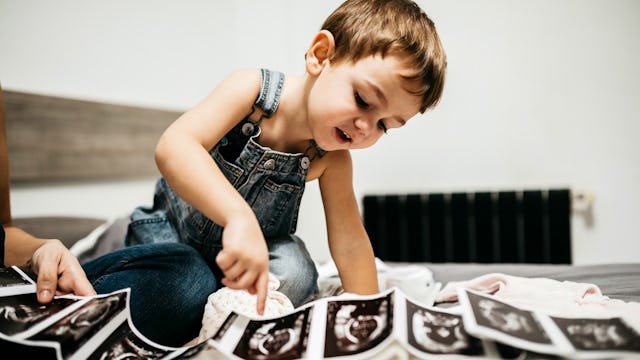This Is How I Decided Whether Or Not To Have A Second Child

I’ve read all the blogs on the subject, each boasting perfect confidence in the decision to raise one child or to have another. The tone is usually lighthearted, but the arguments range from defensive to arrogant.
They gush over the beautiful sibling bond or hail the latest research showing only-children to be more independent. One side wags a presumptuous finger at spoiled entitlement, while the other rejects spread-thin parenting and strained marriage. Parents of “onlies” brag of their lower expenses, greater ease of travel, and bicker-free homes, while those raising two or more children congratulate themselves on multiplied love and built-in playmates.
Though each point is worthy of consideration, the collective logic amounts to a mere list of pros and cons, not a definitive case for or against creating another human. I can’t be the only one intimidated by the sheer magnitude of the decision, so why is the vastly prevalent attitude one of suspiciously fearless certainty?
Of course, my husband and I are fully vested in our decision, but very few other people actually care whether we have another baby or not. And among those precious few, not one person is standing by to disapprove of our reasoning. Yet, here I’ve been, feeling somehow required to decide and act with absolute, unflinching confidence.
How did I end up so overwhelmed by imaginary pressure? Could the brassy mom-bloggers be driven by the same self-expectation that paralyzed me? Maybe we’re all grappling with the same conditioned belief: that we’re supposed to make and defend all parenting decisions as fiercely as we love our children. Well, I can’t do that. None of us can. I don’t care how surely you wanted number two, or how adamantly you declare yourself “one and done”; your confidence is no match for your love.
Equating one with the other can make us anxiously defensive and, when it comes to more hotly debated issues, downright nasty keyboard warriors.
It’s important to embrace parental self-doubt; not as weakness, but as a reflection of how strongly we want the best for our kids. So I dared take another look at the options—this time welcoming my previously unacceptable fears into the equation: If we stop at one, is our family really complete? What if I suddenly feel “ready” for another baby when it’s too late? How will my son feel about not having a brother or sister? Will I always wonder who our second child would have been?
I accept the unknowns and trust that they don’t reflect right or wrong. There’s no objective measurement for “completeness” of a family, and feeling it doesn’t come with a lifetime guarantee. It’s okay if my experience fluctuates over the years. I can handle any sadness that may arise; I won’t get stuck there. My son isn’t lonely now, and his life will continue to be filled with meaningful relationships no matter what.
For me, the decision to raise an only child could never be fully a comfortable one. But I can tolerate
the emotional risks, knowing that less parenting is not less motherhood.
What would a second child do to our day-to-day sanity and long-term plans? It’s hard enough with one; could I possibly raise two people with enough compassionate resilience to thrive on planet earth for the next hundred years?
Do I even want to crack my heart open again, making it hopelessly dependent upon the wellbeing of another little person? I accept the apprehension and trust that it doesn’t reflect right or wrong.
It’s okay to fall apart on a sleepless night and wonder aloud, “What the hell have we done?” I don’t have to mean it in the morning.
Our personal goals will be delayed—not derailed—by another trip through the newborn, infant, and toddler trenches. Moments of overwhelm will pass, but my instincts aren’t going anywhere; I can lean on them. For me, the decision to have a second child could never be a fully comfortable one. But I can handle the struggle, believing I’m no less of a mother if I don’t enjoy every moment.
Reluctance is not the opposite of motherhood, and fear is not synonymous with uncertainty. As soon as I gave myself permission to be both afraid and resolved, there it was. Blooming among the mixed emotions, I found my answer. Parenting culture wants me to declare it with the strength and confidence befitting somebody’s mother, but I’m here to own my insecurity. It’s borderline taboo to admit maternal hesitation and potential regret, so I’ll just put it right out there… feel free to judge.
We made this decision with a healthy dose of fear. I can’t offer a quippy top-ten list of self-soothing reasons; I simply knew what I wanted when I allowed it to terrify me. It was the hardest decision of my life. And it’s a boy.